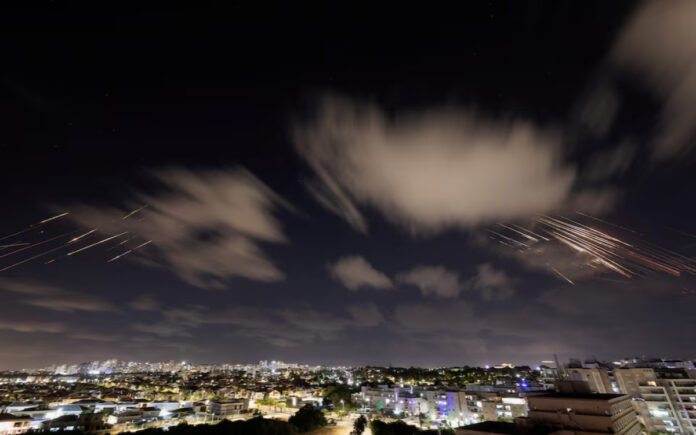Tel Aviv: Israeli Prime Minister Benjamin Netanyahu declared on Tuesday that Iran would face consequences for its missile attack on Israel, raising fears of a wider war. In response, Tehran warned that any retaliation would lead to “vast destruction”.
As the U.S. expressed its full support for Israel, Iran’s armed forces stated that direct intervention by Israel’s allies would trigger a “strong attack” on their bases and interests in the region. Fears of escalating conflict surged, with oil prices climbing 5% amid concerns over the ongoing tensions.
“Iran made a big mistake tonight – and it will pay for it,” Netanyahu said at the start of a political-security meeting, according to a statement. The Revolutionary Guard Corps of Iran claimed the missile assault was a response to Israeli attacks that killed militant leaders and targeted the Iran-backed Hezbollah in Lebanon and Gaza.
As Israel’s campaign against Lebanon intensified over the past two weeks, including the launch of a ground operation on Monday, concerns grew about the possibility of a broader regional conflict involving the U.S. and Iran.
Iran reportedly fired more than 180 ballistic missiles at Israel. Alarms rang out across the country, with explosions heard in Jerusalem and the Jordan River valley. Israelis rushed to bomb shelters as state television reporters lay flat during live broadcasts.
This marked the first use of hypersonic Fattah missiles by Iran, which claimed a 90% success rate in hitting their targets in Israel. Israeli air defenses intercepted most of the missiles, according to Rear Admiral Daniel Hagari, who called the assault a “severe and dangerous escalation”.
Central Israel experienced a “small number” of hits, and damage was reported in southern Israel, including a heavily damaged school in Gadera due to an Iranian missile strike. Although no injuries were reported in Israel, one man was killed in the occupied West Bank, according to authorities.
The Pentagon confirmed that U.S. Navy warships fired around a dozen interceptors against the incoming Iranian missiles. President Joe Biden expressed strong support for Israel and deemed Iran’s attack “ineffective”, noting ongoing discussions about Israel’s response with Netanyahu.
Vice President Kamala Harris reiterated Biden’s position, affirming that the U.S. would defend its interests against Iran. Israeli officials promised that Iran would soon feel the repercussions of its actions, with U.N. Ambassador Danny Danon stating, “The response will be painful.”
The White House echoed this sentiment, pledging “severe consequences” for Iran, although details of these consequences were not specified. Unlike previous instances, the U.S. stopped short of urging restraint from Israel, indicating a more aggressive posture.
Also Read | Khamenei’s Threat: ‘Stronger Blows’ to Follow Iran’s Missile Assault on Israel
Iran’s General Staff warned that any Israeli response would lead to “vast destruction” of Israeli infrastructure, targeting regional assets of any Israeli ally that intervened. Iran’s foreign ministry asserted that its operations were defensive and aimed solely at Israeli military and security facilities.
U.N. Secretary-General António Guterres condemned the escalating violence, emphasizing the need for a ceasefire. EU foreign policy chief Josep Borrell echoed this sentiment, warning that the ongoing cycle of attacks and retaliation risks spiraling out of control.
Also Read | Hamas Calls Iranian Missile Strikes ‘Heroic’ in Response to Recent Deaths
Escalation in Lebanon
Iran vowed retaliation after Israeli strikes killed key Hezbollah leaders in Lebanon, including Hassan Nasrallah. Hamas praised the Iranian missile strikes as revenge for the Israeli assassinations of militant leaders, celebrating as rockets were launched toward Israel.
In Beirut, Israeli strikes resulted in the death of the Imam Hussein division commander, a Hezbollah-linked figure. Lebanon’s health ministry reported 55 deaths and 156 injuries due to Israeli attacks on Tuesday.
Also Read | UN Chief Urges Immediate Ceasefire in Lebanon, Calls for Respect of Sovereignty
Israeli forces launched limited ground raids into Lebanon overnight, marking a significant escalation in cross-border fighting. Nearly 1,900 people have died and over 9,000 have been injured in Lebanon in nearly a year of conflict, with most casualties occurring in the past two weeks.
The ground campaign into Lebanon, the first in 18 years, could significantly escalate tensions, pitting Israeli soldiers against Hezbollah, Iran’s most formidable proxy force in the Middle East.



